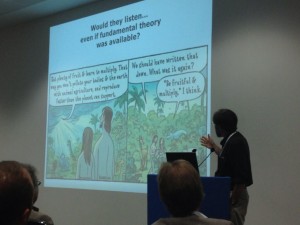The vibrant INTECOL13 conference has ended and it is time to reflect on the outstanding week of posters, plenary talks and presentations. Real difficult choices had to be made which talks to attend. Hundreds of great ideas from the conference will remain undocumented in this post. In this post, I will present only a tiny fraction of all the incredible ideas, discussions and future direction we as ecologist need to take.
The theme of the conference was ‘Into the next 100 years’. For me, as a starting ecologist, it was great to feel I am a part of the community who is looking for ways to insure the future of our planet and challenge the way we think.
The theme was explored in the conference from several different angles. Georgina Mace challenged us to think: “who is conservation for?” She encouraged us not to get blinded by our passion for the nature. Mace reminded us that current conservation is intimately tied up with people. People and nature are and will be the future of the conservation. Successful conservation in future would have to cooperate with the variety of disciplines and return to ask the fundamental ecological questions.
The need to understand fundamental ecological questions was raised at the Symposia on “Emphasizing the Importance of Basic Science in Ecology” by John Harte, Robert May and others in this session. Harte was pointing out that as ecologist we enjoy observing the uniqueness of species and communities, but sometimes we tend to close our eyes to the fundamentals of ecology. Harte pointed out that lack of the fundamental ecological theory is one of the reasons we fail to communicate our findings to the decision makers. I loved the end of Harte’s talk: “Will the world listen to us even if we had a fundamental ecological theory?” I could not resist the temptation to add the final slide of Harte’s presentation (sorry for the bad angle), but I hope you enjoying it as much as I did.

The discussion at the end of this session invited young ecologist to explore the fundamentals of ecology. During this discussion, it was pointed out by the senior ecologists that we young ecologist seems to avoid the theory and the fundamentals of ecology. Perhaps, we could fix that by reading “100 influential papers” edited by Grubb and Whittake.
At the conference, I observed that there is a growth interest in functional and trait-based ecology. I am not a big fan of principal component analysis in interpreting and especially describing principal components as significant, but I was impressed by Sandra Diaz’s plenary talk nonetheless. Only the fact that TRY database contains information on 43400 vascular plant traits is something to admire. Diaz presented work on TRY database data to define the space of vascular plants. It was an interesting to learn that all world plants could be lumped to small herbaceous plants and moderately large leaved, moderately large seeded woody plants. Diaz claims that this space of vascular plants could be used as the bases to compare plants in different areas at different scales. She suggested that such plant space could be related to functional diversity metrics and then to ecosystem properties.
Diaz suggested that functional trait idea for plants could be implemented for any organisms. One could see a lot of overlap in plant and invertebrate trait based approaches in the talks and poster of the conference. It was obvious that at least invertebrate ecologists still have a long way to go before caching up with the progress plant ecologists made in the discipline of trait based approach and functional ecology. The biggest challenge for the other organisms is the lack of such giant databases as TRY, but “we should keep TRYing” as Diaz invites us.
Despite the challenges to understand functional importance of other organisms, there is progress in the animal world too. I was really happy to see so many studies on ants and other invertebrates in this conference. Robert Ewers invited us to stop assuming that ants are important and start studying them. Petr Klimeš challenged and demonstrated that ants might not always be important or at least we don’t know why they appear to be unimportant in certain settings. Owen Lewis and Helena Wirta demonstrated that to understand the complexity of invertebrate world, we might need to be brave and dive to unexplored insect world with a lot of creativity.
I am convinced that ecologist will be busy for the next 100 yeas asking new and the old questions in ecology, but we seem to know how to do it. In the next 100 years, let us explore the world with the passion for nature and let’s not forget to be open-minded.
Conservation planning…
…for biodiversity informatics and conservation
